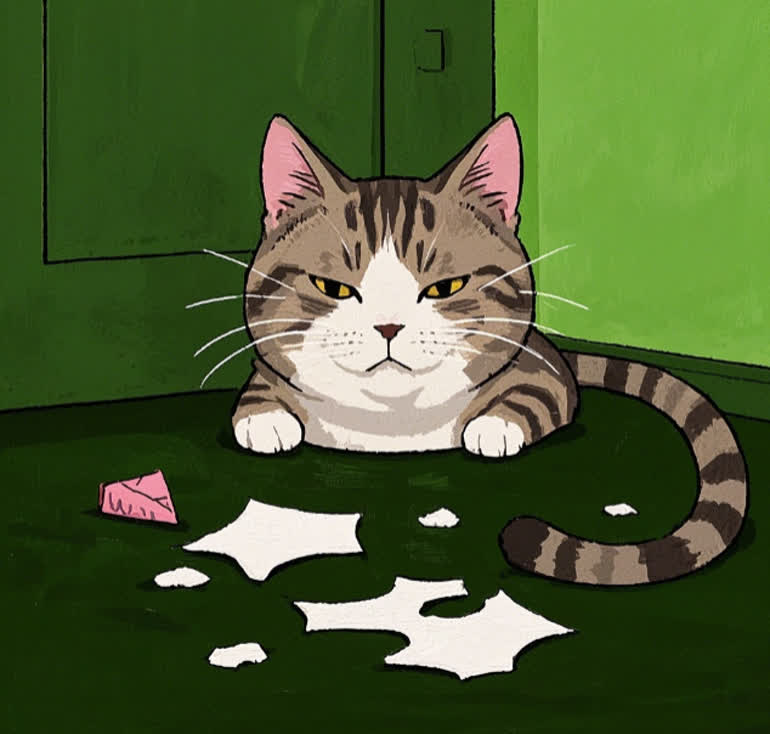Let’s face it—most cat owners have experienced the aftermath of feline mischief. One moment, your home is calm; the next, your favorite sofa cushion is shredded, a houseplant lies toppled, or a glass has mysteriously fallen off the counter. And there, slinking into the room with ears flattened and tail tucked, is your cat—looking, dare we say, guilty. But do cats truly feel remorse? Or are those “apology signs” just a coincidence? In this article, we’ll explore why cats behave this way and what their body language really means.
Before diving into the “guilty” behavior, it’s crucial to understand why cats destroy things in the first place. Contrary to popular belief, cats aren’t seeking revenge or plotting to ruin your day. Their actions are often rooted in natural instincts or unmet needs:
Territorial Marking: Cats have scent glands in their paws. Scratching furniture isn’t just a way to sharpen claws—it’s also a means of marking territory. If your cat feels stressed or threatened by changes in their environment (like a new pet or moving house), they may scratch excessively to reclaim their space.
Boredom or Anxiety: Cats are intelligent creatures who thrive on mental and physical stimulation. If left alone for long periods or without toys to play with, they may resort to destructive behavior out of sheer boredom.
Hunting Instincts: A knocked-over glass or torn curtain might be your cat’s way of practicing “hunting.” Small, moving objects trigger their predatory drive, leading to playful (but chaotic) antics.
Health Issues: Sometimes, sudden destructive behavior can signal an underlying health problem. For example, urinary tract issues might cause a cat to urinate outside the litter box.
By addressing the root cause of your cat’s behavior, you can reduce future incidents and build a happier coexistence.
So, your cat tears up the couch, then slinks away with what appears to be a guilty expression. Are they truly apologizing? According to animal behavior experts, cats don’t experience guilt in the human sense. However, they do respond to your reactions. When you scold them, they may associate your anger with their actions and exhibit submissive body language to avoid conflict.
Common “apology signs” cats display include:
Ears flattened against the head
Avoiding eye contact
Hiding or crouching
Slowly blinking or rubbing against you
Bringing you a “gift” (like a toy or dead insect)
These behaviors aren’t heartfelt apologies but rather attempts to diffuse tension. Cats are masters of reading human emotions, and they quickly learn that certain actions (like destroying property) lead to negative reactions. Their “guilty” demeanor is a survival strategy, not an admission of wrongdoing.
Instead of scolding your cat (which can increase anxiety and worsen behavior), try these positive reinforcement strategies:
Redirect Their Energy: Provide scratching posts, interactive toys, and puzzle feeders to channel their instincts.
Create a Safe Environment: Designate cat-friendly spaces with hiding spots and vertical perches to reduce stress.
Reward Good Behavior: Praise your cat when they use their scratching post or play calmly. Treats and affection reinforce positive habits.
Stay Calm: If you catch your cat in the act of destruction, startle them gently (e.g., clap your hands) to redirect their attention, then offer an appropriate outlet.
Consistency is key. Over time, your cat will learn what’s acceptable and feel more secure in their environment.
While cats don’t apologize in the way humans do, they can form strong bonds with their owners and exhibit behaviors that resemble remorse. A 2019 study published in Animal Cognition found that cats adjust their behavior based on human reactions, suggesting they understand cause and effect. For example, if your cat knocks over a vase and you react angrily, they may avoid that behavior in the future—not out of guilt, but to avoid negative consequences.
Additionally, cats may use “appeasement gestures” like slow blinking or headbutting to restore harmony after a conflict. These actions signal submission and a desire to reconnect, which can feel like an apology to us.
If your cat’s destructive behavior is sudden, extreme, or accompanied by other symptoms (e.g., aggression, changes in appetite), it’s wise to consult a veterinarian or animal behaviorist. They can rule out medical issues and provide tailored advice to address anxiety or compulsive disorders.
At the end of the day, cats are complex creatures with their own unique personalities. While they may not understand guilt, their “apology signs” are a testament to their ability to adapt and communicate with us. Instead of dwelling on the mess, focus on building a trusting relationship through patience, play, and positive reinforcement. After all, isn’t that what unconditional love is all about?










